Search Results
Fine Jewelry University Articles matching: “Identifying gemstones”
Showing only FJU Article results. Click here to show all results.
Fine Jewelry University (Show All FJU Articles)
-
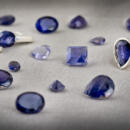
Gem in the Spotlight: Iolite
Iolite is maybe not the first gemstone people think of for their blue-violet jewelry, but it should be near the top of the list. Iolite’s color range of blue, blue-violet, and violet competes for public attention with sapphire, tanzanite, and amethyst. They may have name recognition, but iolite has a rich, unique color and great gem value on its side. It is more subtlety nuanced than amethyst and deeper than many tanzanites. Iolite’s name comes from its violet color. It is from the Greek word “ios” meaning violet. Unlike many
-

Gem in the Spotlight: Topaz
Topaz is a gemstone with amazing variety. Topaz is naturally colorless and clear like a diamond, but it can also take on an entire range of colors. Yellow to reddish-orange is known as Precious Topaz or Imperial Topaz. Imperial Topaz is one of the expensive varieties of Topaz. Gem suppliers can even bombard Topaz in a nuclear reactor to produce various shades of Blue Topaz. Topaz is the birthstone for November, and they make great gifts for anyone born in November, or for anyone that just likes beautiful jewelry.
-
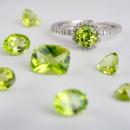
Gem in the Spotlight: Peridot
Peridot is a lovely yellow-green gem with a rich history. Legend has it that Peridot was the favorite gemstone of Cleopatra. The ancients called it the “gem of the sun”. It was believed that peridot could chase away evil spirits and dissolve curses but only when set in gold. Peridot is the birthstone for August. It is also the accepted anniversary gemstone for the 16th year of marriage. Peridot’s unique yellow-green color is very attractive. The name “Peridot” is simply a French word derived from the Arabic for green. Peridot’s
-
Synthetic Gems: The Whole Story
Synthetic rubies, emeralds, sapphires, diamonds and more are everywhere. Man made gems come in many forms: every thing from simple glass to high tech chemical tongue twister like gadolinium gallium garnet (also called GGG) and the modern diamond simulant moissanite. Synthetic gems are not bad, fakes, or the curse of a modern society. The more you know about them, the better you can understand their place in our society and in the jewelry world.
-

The Magic of Polarized Light
… Polarizing filters are critical to many fields of study. Without them, we wouldn’t be able to easily identify gemstones, TVs and monitors wouldn’t work in the same way, and the latest blockbuster movie wouldn’t pop off the screen the way it … allow them to function efficiently as they do without negative side effects. Using Polarized Light in Gemology Some gemstones, due to their unique chemical structure, actually polarize light themselves. These gems are doubly refractive (DR) …
-

How Are Lab Grown Diamonds Made?
…natural diamonds. This fact, while not generally detrimental to the appearance of the diamonds, is quite useful when identifying them as lab grown . So, Which Kind of Lab Grown Diamond Should I Choose? If you are considering a lab grown diamond… so making artificial carbon crystal was the problem of lab grown diamonds. For decades, manufacturers of synthetic gemstones tried growing diamonds like they grew rubies, sapphires, and emeralds. It failed. Then they had the idea to grow …
-
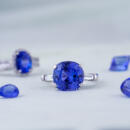
Gem in the Spotlight: Tanzanite
… that isn’t heated and is still pretty enough for jewelry displays trichroism. Trichroism is an effect that causes gemstones to display different colors when viewed at different angles. Tanzanite in its raw form has three colors: blue, purple… become extremely scarce in the future, further driving its desirability. Tanzanite is currently one of the rarest gemstones, and it is only found in one place on earth. In 2002 tanzanite was added as one of the birthstones for December …
-
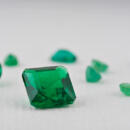
Gem in the Spotlight: Emerald
… to green than to any other color thereby making it easier on the eyes. Pliny said that emeralds were the only gemstones that delighted the eye without fatiguing it. In fact, Emperor Nero was said to wear a kind of emerald glasses to watch the… in Columbia, it is one of the finest green emeralds ever discovered Care and Cleaning of Emerald Like all precious gemstones, emeralds require proper care to maintain their brilliance and value. Emeralds are relatively durable, but they can …
-
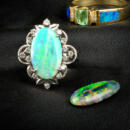
Gem in the Spotlight: Opal
… opal”. Opal has a refractive index of 1.37 – 1.47 and a Mohs hardness of 5.5-6. This makes it one of the softest gemstones commonly used in jewelry. For reference, here are the Mohs hardness values for some other gemstones you may know: …, it is important to care for this delicate gemstone to maintain its brilliance. Opal is not as hard as some other gemstones, making it susceptible to scratches and damage from sharp impacts. Household chemicals and extreme temperature …